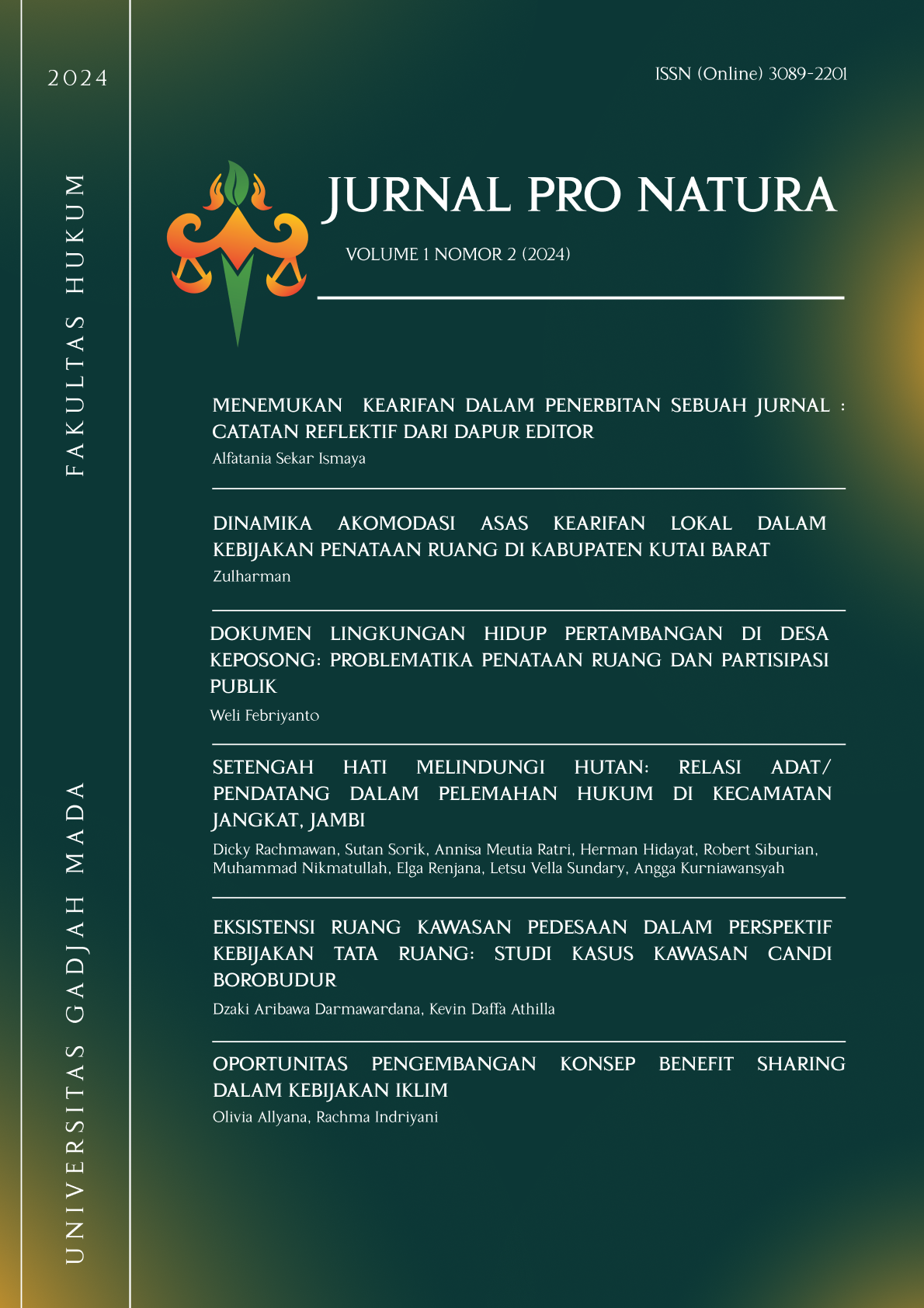Oportunitas Pengembangan Konsep Benefit Sharing dalam Kebijakan Iklim
Abstract
Artikel ini menganalisis penerapan konsep benefit-sharing dalam kebijakan iklim internasional, dengan fokus pada perlindungan masyarakat adat. Penelitian ini menggunakan pendekatan normatif dan konseptual, dengan teknik studi kepustakaan untuk menganalisis peraturan, buku, laporan, dan hasil penelitian yang relevan. Benefit-sharing mengacu pada proses terkoordinasi dan dialogis dalam membangun kemitraan untuk mengidentifikasi dan mendistribusikan manfaat ekonomi, sosial budaya, dan lingkungan dengan fokus pada kelompok yang rentan. Meskipun diakui dalam instrumen hukum internasional seperti CBD, penerapannya dalam kerangka kebijakan iklim seperti UNFCCC dan Paris Agreement masih belum eksplisit. Namun, konsep transfer teknologi yang terdapat dalam instrumen ini mencerminkan prinsip benefit-sharing. Contoh implementasi yang berhasil termasuk social forestry di ASEAN dan community forestry di Nepal, yang menunjukkan potensi besar dalam memberikan manfaat langsung kepada masyarakat adat serta mendukung mitigasi perubahan iklim. Namun, potensi risiko dalam penerapannya perlu dimitigasi seperti dalam penerapan Areal Preservasi di Indonesia yang memicu risiko konflik lahan dan marginalisasi masyarakat adat. Artikel ini mengusulkan penguatan pengaturan dan implementasi benefit-sharing dalam kebijakan iklim internasional untuk memastikan keadilan sosial dan kesejahteraan bagi masyarakat yang paling rentan terhadap dampak perubahan iklim serta kajian hukum nasional yang mendalam dan inklusif.
References
A.A., Nawir, et. al. “Thinking about REDD+ Benefit Sharing Mechanism (BSM): Lessons from Community Forestry (CF) in Nepal and Indonesia.” CIFOR Inforbrief , no. 112 (2015). https://doi.org/10.17528/cifor/005506.
Antonia, Maria. “Climate Change and Indigenous Groups: The Rise of Indigenous Voices in Climate Litigation.” E Public Law Journal 9, no. 3 (2022): 213.
BioCarbon Fund. “Benefit Sharing Mechanism.” https://biocf.jambiprov.go.id/page/benefit-sharing-mechanism (diakses 24 Desember 2024).
Bram, Deni. “‘Perspektif Keadilan Iklim Dalam Instrumen Hukum Lingkungan Internasional Tentang Perubahan Iklim.” Jurnal Dinamika Hukum 11, no. 2 (2011): 285.
Doly, Denico & Firyal Nabihah. “Kajian Singkat Terhadap Isu Aktual dan Strategis: Pelindungan Masyarakat Hukum Adat dari Green Grabbing.” Info Singkat XVI, No. 17/I/Pusaka (September, 2024).
ICCAs Indonesia. “RUU KSDAHE Disahkan, Atur Areal Preservasi Dan Hutan Adat: Bagaimana Isinya?” https://iccas.or.id/articles/read/577 (diakses 24 Desember 2024).
Etchart, Linda. “The Role of Indigenous Peoples in Combating Climate Change.” Palgrave Communications 3 (2017): 2. https://doi.org/10.1057/palcomms.2017.85.
Intergovernmental Panel on Climate Change (IPCC). “Climate Change 2023: Synthesis Report. Summary for Policymakers. Contribution of Working Groups I, II, and III to the Sixth Assessment Report of the Intergovernmental Panel on Climate Change (diedit oleh Core Writing Team, Hoesung Lee and José Romero).” Geneva: IPCC, 2023. https://doi.org/10.59327/IPCC/AR6-9789291691647.001.
Jalleta, Abebe Kebede. “Access and Benefit Sharing Effectiveness: International Environmental Law Implementation at the Domestic Ethiopian Level.” Beijing Law Review 12 (2021): 485–508.
Lee, Woo Jin, & Rose Mwebaza. “The Role of the Climate Technology Centre and Network as a Climate Technology and Innovation Matchmaker for Developing Countries.” Sustainability (Switzerland) 12, no. 19 (October 1, 2020). https://doi.org/10.3390/SU12197956.
Manggala, Satrio. Delapan Catatan Krusial RUU KSDAHE. Wahana Lingkungan Hidup Indonesia, 2024.
Marzuki, Peter Mahmud. Penelitian Hukum, edisi ke-6. Jakarta: Kencana Prenada Group, 2010.
Morgera, Elisa. “Under the Radar: The Role of Fair and Equitable Benefit-Sharing in Protecting and Realizing Human Rights Connected to Natural Resources.” Glasglow, 2018. http://www.strath.ac.uk/research/strathclydecentreenvironmentallawgovernance/http://www.strath.ac.uk/research/strathclydecentreenvironmentallawgovernance/ourwork/research/benelexproject/.Electroniccopyavailablet:https://ssrn.com/abstract=2887803.
Office of Natural Resources and Environmental Policy and Planning. “Thailand’s Intended Nationally Determined Contribution (INDC).” Thailand: Bangkok, 1 Oktober 2015.
Secretariat of the Convention on Biological Diversity. Introduction to Access and Benefit-Sharing. Montreal: Secretariat of the Convention on Biological Diversity, 2011.
Sharman, Nicola. “Inter-State Climate Technology Transfer under the UNFCCC: A Benefit-Sharing Approach.” Review of European, Comparative and International Environmental Law 31, no. 3 (November 1, 2022): 435–46, https://doi.org/10.1111/reel.12454.
Sunggono, Bambang. Metodologi Penelitian Hukum, edisi ke-13. Jakarta: Rajawali Press, 2012.
Tamara, Ade, Nining Liswanti, & I Wayan Susi Dharmawan. “Hak Masyarakat Dan REDD+ Di Indonesia: Temuan Dari Lokakarya Implementasi Perlindungan Di Provinsi Jambi.” https://forestsnews.cifor.org/82431/hak-masyarakat-dan-redd-di-indonesia?fnl=e (diakses 24 Desember 2024).
United Nations Framework Convention on Climate Change (UNFCCC). “Report of the Conference of the Parties serving as the meeting of the Parties to the Paris Agreement on the third part of its first session: Technology Framework under Article 10, Paragraph 4, of the Paris Agreement.” Katowice, 2-15 Desember 2018.
United Nations Framework Convention on Climate Change (UNFCCC). Technical Workshop on the Institutional Arrangements of the Santiago Network of the Warsaw International Mechanism for Loss and Damage: Draft Concept Note (ver. 20 April). Bonn: UNFCCC Secretariat, 2022.
United Nations General Assembly. “Rights of Indigenous Peoples. Resolution 72/155.” December 19, 2017. UN Doc. A/RES/72/155.
UN-REDD. “UN-REDD Programme Social and Environmental Principles and Criteria Introduction and Context.” Paraguay: Asuncion, 25-26 Maret 2012. UNREDD/PB8/2012/V/1. 2012.
UN-REDD. “Technical Assistance for REDD+ Implementation: Climate Change Mitigation through Social Forestry Actions in ASEAN Countries.” Regional Analysis of the Nationally Determined Contributions in Asia (FAO, April 9, 2022). https://doi.org/10.4060/ca7264en.
Wahyudi, Riko, et. al. “Effectiveness, Efficiency, and Equity in Jurisdictional REDD+ Benefit Distribution Mechanisms: Insights from Jambi Province, Indonesia.” Trees, Forests and People 18 (2024).
Copyright (c) 2024 The author(s)

This work is licensed under a Creative Commons Attribution-ShareAlike 4.0 International License.
Penulis yang menerbitkan di jurnal ini menyetujui ketentuan berikut:
Penulis memegang hak cipta dan memberikan hak publikasi pertama kepada jurnal dengan karya tersebut secara bersamaan dilisensikan di bawah Creative Commons Attribution License yang memungkinkan orang lain untuk berbagi karya dengan pengakuan atas kepenulisan karya dan publikasi awal di jurnal ini.
Penulis dapat membuat perjanjian kontrak tambahan yang terpisah untuk distribusi non-eksklusif dari versi terbitan jurnal (misalnya, mempostingnya ke repositori institusi atau menerbitkannya dalam buku), dengan pengakuan atas publikasi awalnya pada tahun jurnal ini.
Penulis diizinkan dan didorong untuk memposting karya mereka secara online (misalnya, di repositori institusi atau di situs web mereka) sebelum dan selama proses penyerahan, karena hal ini dapat menghasilkan pertukaran yang produktif, serta kutipan yang lebih awal dan lebih besar atas karya yang diterbitkan.


